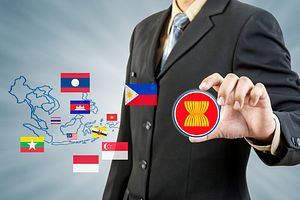The 10-members of the Association of Southeast Asian Nations (ASEAN) have done a fairly ordinary job of selling what would be the biggest regional deal in decades with only the connected few knowing exactly what the make-up of the ASEAN Economic Community (AEC) will be.
Those self-described “elites” are not too difficult to identify as no Southeast Asian government has ever fully appreciated the separation of powers between business and the executive.
Big business, sovereign wealth funds and the political families that control them will hold gold membership passes to an exclusive club that will evolve into a formidable cartel set to take advantage of a mass market consisting of 600 million people when it emerges by the end of 2015.
The division and migration of mass labor, production and delivery of goods, and provision of professional services in areas like finance and medicine will be the high-end of a trading bloc that is modeled on the European Union but lacks many of the social characteristics – like the right of ordinary citizens to live and work in a neighboring country – that made the EU a real global entity.
There will be exceptions for menial labor such as domestic helpers.
Equally the people of Europe went to the polls and voted in innumerable referendums and general elections over the final make-up of the EU, its currency and the rights and obligations of its members. Southeast Asians were never given such a voice.
Among ASEAN nations there is no voting at all in communist Vietnam or Laos or among the religious puritans of Brunei, which plans to introduce Sharia law in April. Few would believe that the government in Myanmar would be elected if a proper poll, free of military interference, was held.
Long-serving governments in Malaysia and Cambodia have clung onto power largely through gerrymandering and a friendly press while Singapore’s founding families are also feeling unloved amid a sharp downturn in their popularity at the ballot box.
In Thailand a democratically elected government has been challenged by a relative few with royal connections, seeking control of the executive, the military and the extraordinary tentacles of business ahead of an inevitable change in the monarchy.
Only Indonesia and the Philippines have proven themselves capable of handling democratic change in governments while delivering on regular elections. But neither of these two matter as much because their status as island-nations means they are on the outside of the all-important road-transport networks.
This is dangerous, not just because the AEC lacks a proper mandate from its citizens but also because the handful of elected governments that have backed it since inception are facing hostile electorates and those that don’t go to the polls are seeing increased agitation from their respective populations.
Migrant labor is often a sore point and the advent of the AEC could also lead to an escalation in regional tensions if it fails to deliver on the hype – more jobs and improved standards of living as opposed to more dollars for political families and their enterprises.
Luke Hunt can be followed on Twitter @lukeanthonyhunt

































